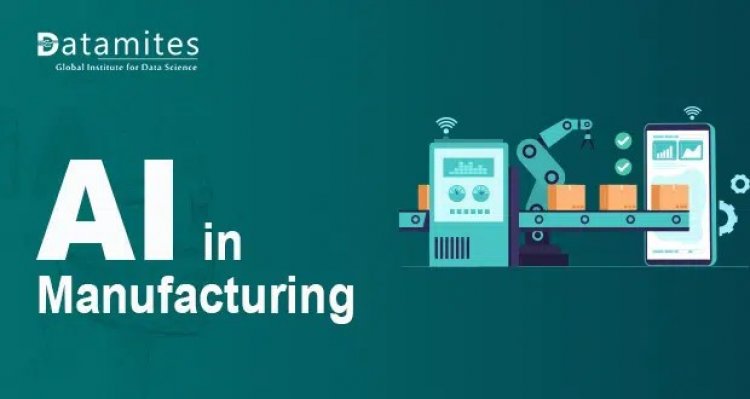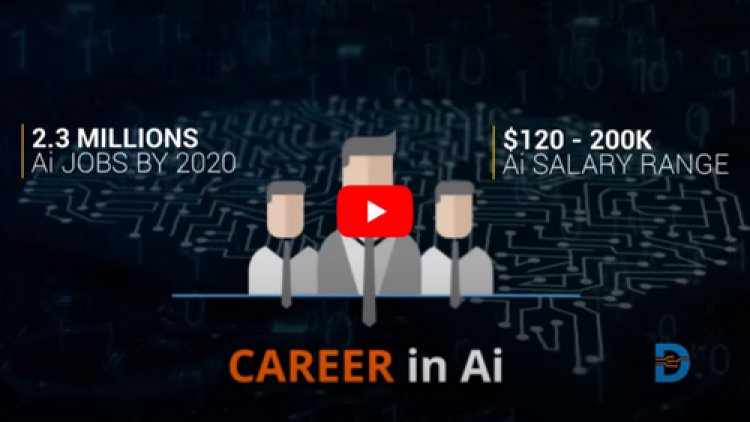How is Artificial Intelligence used in the Manufacturing Industry?
Artificial Intelligence in manufacturing enhances automation, predictive maintenance, and quality control, improving efficiency and reducing costs. AI-powered systems optimize production processes, detect defects, and streamline supply chain management for greater productivity.

According to Global AI in Manufacturing Industry Trends, the market is expected to grow at a CAGR of 57.2 percent from 2016 to 2026, reaching $16.7 billion.
Artificial intelligence can take data from sensors, equipment, and people, then apply it to algorithms to improve operations or accomplish light-out production. In the sphere of manufacturing, AI applications are numerous and innovative. It has completely transformed the way things are designed, providing actionable data at every stage of the design and production process.
Here are some of the roles played by AI in the Manufacturing Industry:
Design failure can be predicted
In the manufacturing industry, machinery breakdowns are prevalent, resulting in increased downtime, higher expenses, and a longer time to market. Failures that go undetected might have a negative impact on the final product’s quality and performance.
AI allows for the early detection of product or equipment faults, preventing severe breakdowns in the future, thanks to predictive learning. This reduces downtime, lowers the cost of idle time, and boosts productivity.
Assurance of Quality
The preservation of a desired degree of quality in a service or product is known as quality assurance. Because most flaws are apparent, AI systems can detect variations from expected outputs using machine vision technologies. When a final output is of poorer quality than planned, AI systems send out an alert to users, allowing them to respond and make changes. Manufacturers can ensure high-quality products with a shorter time to market by adopting AI for in-depth quality testing.
Automated Processes
Businesses can use AI-powered software to help them optimise processes in order to achieve long-term production goals. To detect and eliminate bottlenecks in the organization’s processes, manufacturers can use AI-powered process mining solutions. In the manufacturing industry, for example, timely and correct delivery to a customer is the ultimate goal. Building a consistent distribution system is more difficult if the organisation has multiple factories in different locations.
Management of Inventory
Inventory management inefficiency can result in considerable cost overruns for a manufacturing organisation. Manufacturers can maintain their order records and add or delete new inventories using AI tools. Artificial Intelligence is essential for managing stocks depending on demand and availability. Because machine learning solutions are good at dealing with demand forecasting and supply planning, they can help with inventory planning. These technologies help firms better manage inventory levels, reducing the likelihood of cash-in-stock and out-of-stock crises.
Management of Energy
Artificial intelligence can assist in the field of energy management, which is typically disregarded. Most engineers are too busy to calculate the cost of producing energy consumption. Using artificial intelligence to analyse a manufacturing operation’s energy consumption can result in significant cost savings. Reduced costs allow more funds to be allocated to process improvement efforts, resulting in higher yield and quality.
Optimization of the Supply Chain
With thousands of parts and hundreds of locations, today’s supply chains are extremely difficult to monitor. AI is quickly becoming a crucial tool for getting things from the factory to the buyer. Manufacturers can establish the optimal supply chain solution for all of their products using machine learning algorithms.
You can also refer:
Artificial Intelligence Certification Course Fee in 2022
What is the Salary of an AI Expert in the Asia Pacific Region?
Robotics
Industrial robots, often known as manufacturing robots, automate repetitive operations, reducing or eliminating human error, and allowing humans to focus on more productive areas of the operation. Assembly, welding, painting, product inspection, picking and putting, die casting, drilling, glass production, and grinding are some of the applications.
Maintenance that is planned ahead of time
A single equipment failure can dramatically affect the entire production process, resulting in increased downtime and expenses. As a result, proper and timely machinery maintenance is critical. Unfortunately, this is frequently neglected until a severe failure occurs. AI-powered manufacturing solutions can help manufacturers automate processes, allowing them to create smart operations that cut costs and downtime.
Effective Demand and Price Forecasting
AI systems integrate predictive analysis with human intelligence to accurately forecast product demand and pricing. It will gather data from many sources and extensively evaluate it in order to create accurate forecasts.
Cost-cutting
Organizations may improve their analytical capability by leveraging AI technologies, allowing them to use their resources more efficiently, generate better projections, and lower inventory costs. Companies can also transition to predictive maintenance, which eliminates downtime and lowers maintenance costs, thanks to improved analytics capabilities.
Cyber security
With an ever-increasing number of devices and limited cybersecurity resources, we’re turning to artificial intelligence to assist us to address some of the most pressing cybersecurity issues. Along with their separate networks, security appliances, and applications, operational technology environments produce vast amounts of security logs and data. Artificial intelligence can assist in sifting through the noise by automatically recognising intrusions, malware, fraud, and staff actions that are outside of regular baselines, ultimately raising threat information.
Operator assistance is available 24/7
Intelligent AI-powered chatbots can provide operators and field employees with 24/7 technical support so they can execute their jobs safely without having to wait for a human expert. This lowers the expense of technical training and shortens the time it takes to resolve issues.
Using computer vision, ensure the safety of your employees
Work is continuously monitored by AI-powered computer vision cameras to ensure that safety protocols such as wearing Personal Protective Equipment (PPE) are followed (PPE). When necessary safety procedures or equipment are not followed, computer vision powered by AI can automatically monitor and inform supervisors.
What we learned so far…
According to Accenture and Frontier Economics, AI-powered solutions might boost labour productivity by up to 40% across 16 industries, including manufacturing, by 2035.
For any industry, artificial intelligence is a game-changing technology. AI is becoming increasingly accessible to businesses as technology advances and costs fall. It can be effective in making things, as well as making them better and cheaper, in manufacturing. Manufacturing has always been keen to adopt new technologies, and it has done so successfully by whole-heartedly accepting Artificial Intelligence.
DataMites provides a globally accredited Artificial Intelligence course with industry-recognized certification. Competing with esteemed institutions like IIT and IIM, DataMites delivers premium AI training. The program includes advanced AI concepts, practical projects, and expert mentorship. Renowned for excellence, DataMites empowers professionals with the expertise to succeed in AI-driven industries.
According to Glassdoor.com, the average national AI Engineer Salary in India is $9,00,000 lakh per year! AI does, in fact, offer lucrative professional opportunities. Join the Top AI Training institute out there, DataMites, to acquire the best-certified training in Artificial Intelligence. DataMites provides in-deptph instruction in AI and other related topics such as Data Science, Machine Learning, Deep Learning, Artificial Intelligence, and Python Programming!
Check out the video – Artificial Intelligence Course Introduction.

 Thushara C.P
Thushara C.P 